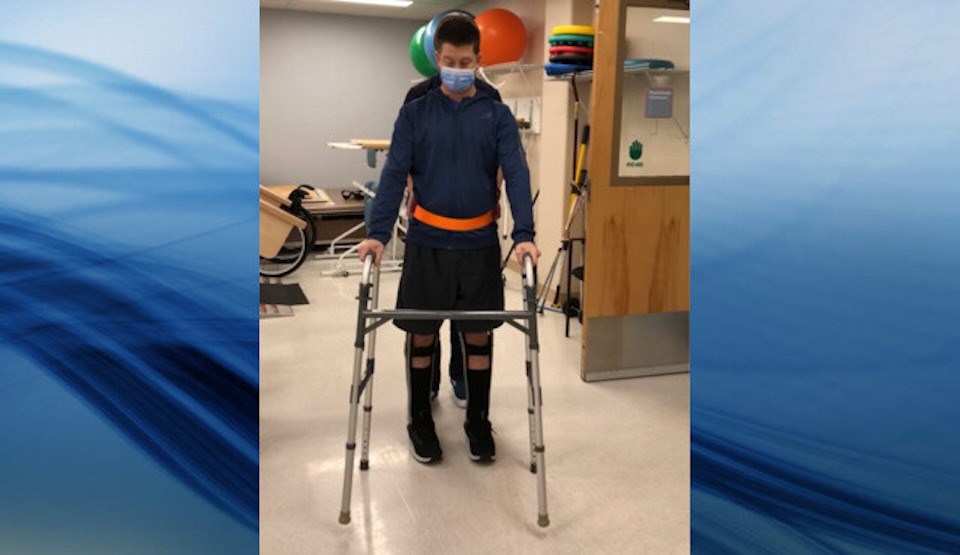A government program designed to compensate Canadians with COVID-19 vaccine side effects has approved paying out nearly $2.8 million so far, but a Summerland man is one of many still in limbo.
Julian Scholefield, 45, contacted a neurological disease that left him suddenly paralyzed from the waist down in 2021, 12 days after taking his second dose of a Pfizer-BioNTech vaccine.
He spent three months in hospital and relies on a wheelchair to this day. Scholefield believes, after extensive consultation with his doctors, that his condition is a rare reaction to the vaccine.
But the government has yet to confirm they agree with that and provide help, much to Scholefield's ongoing frustration.
In June 2021, the federal Vaccine Injury Support Program began accepting claims for those who have a "serious and permanent" injury related to vaccination.
Scholefield applied to the program in October 2021, and provided his medical records in January 2022.
Then began the waiting, the often-unanswered emails and phone calls to multiple levels of government asking for updates or action, all while the father of two was unable to work and was re-learning how to live his day-to-day life.
The latest statistics, dated Dec. 1 2022, show VISP has received 1,299 claims, just 50 of which have been approved, to a total tune of $2.779 million in compensation.
Lake Country man Ross Wightman was one of the first wave of people whose vaccine injuries were certified through VISP, in May 2022.
Scholefield's is one of 221 cases that have been assessed by the Medical Review Board, one of the final steps, but he has yet to receive a decision.
"They informed me that I should have something in the new year, with no specific date and no indication as to what that decision might be," Scholefield said.
"I'm sort of cautiously optimistic that they'll get back to me relatively soon with a positive response. But then from there, I know it's still an uphill battle of determining exactly what I get, what terms of compensation, and for how long?"
His care comes with costs, and his family has spent out-of-pocket to renovate their home to make it wheelchair-accessible. To what extent any of that will be covered remains to be seen.
Scholefield is frustrated that the process has taken this long, and that while the government spent so much money so quickly on the vaccine rollout, they do not seem to be as eager to spend on vaccine victims.
"We are the people that followed the rules and got the vaccine, and now are being left kind of out to dry," Scholefield said, adding it was well known there were rare risks involved, and he believes the government should have prepared for that.
"But no, you got to battle, and you have to wait. It's over a year now that my claim has been with them with really nothing and no apology for it, and no reasoning behind other than it just it takes time ... What's taking the time? It took less time for me to to be injured and to go through three months of medical help in the hospital system than it has for them to review the files and come up with a determination. It's ridiculous."
Recovery for Scholefield is slow, but still progressing. He is still in a wheelchair and still paralyzed. He struggles with wondering whether to accept his condition and move on, or whether to keep using all his limited energy towards minor progression through rehab work.
The same goes for the fight to get acknowledgment from government.
"I try not to dwell on the fact that I don't get responses from people and I try not to let it take up too much of my brain space, because I think that would just get me into a negative downward spiral," Scholefield said.
"You can email out to the federal Minister of Health until you're blue in the face, and that's not gonna make him respond."
Whatever the decision is and whenever it arrives, Scholefield knows that is when the fight begins anew. Currently, 18 cases have already submitted appeals to the Medical Review Board.
Scholefield hopes not to join that number, and intends to keep the spotlight on the situation for himself and all others in his shoes.
"The government knew that there were going to be side effects and that there were going to be issues. And so why not jump on board, looking after those people and making it right? It just doesn't make sense."
The Public Health Agency of Canada has previously stated they do not comment on "specific cases or individual situations."
The Vaccine Injury Support Program will provide its next public statistics on June 1, 2023.



